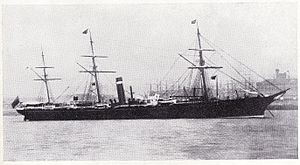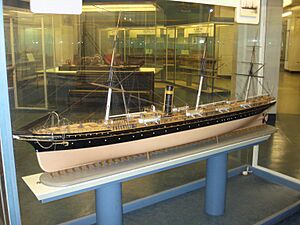SS City of Paris (1865) facts for kids

Inman's City of Paris of 1866
|
|
Quick facts for kids History |
|
|---|---|
| Name | City of Paris |
| Owner | |
| Route | Atlantic crossing. |
| Builder | Tod and Macgregor, Partick, Glasgow, Scotland |
| Launched | December 1865 |
| Fate |
|
| General characteristics | |
| Type | Steamship |
| Tonnage | 2650 tons |
| Length | 346 ft (105 m) |
| Beam | 40 ft (12 m) |
| Sail plan | 3 masts |
| Capacity | Post 1870 refit- 150 saloon and 400 steerage. |
The City of Paris was a British passenger liner (a ship carrying people) run by the Inman Line. This ship was special because it showed that ships using a screw propeller could be just as fast as those with paddle wheels when crossing the Atlantic Ocean. Built by Tod and Macgregor, the City of Paris served the Inman Line until 1884. After that, it was changed into a cargo ship.
Contents
Building a Fast Ship: Design and Competition
By 1865, the Inman Line was the biggest company for passenger steamships traveling to America. They were known for their screw-propelled ships. These ships were good for saving fuel, but they weren't super fast.
In 1862, another big shipping company, Cunard, ordered a new ship called RMS Scotia. This ship had paddle wheels and was very fast. Cunard also ordered China, their first ship with a screw propeller for express mail service. China was almost as fast as Scotia, but it used only half the coal! This showed that screw ships were much more efficient.
Cunard quickly ordered more screw ships to join their fast paddle wheelers, Scotia and RMS Persia. Cunard also started a new service for immigrants, which competed directly with Inman. To fight back, Inman decided to start its own express service.
The City of Paris was the first of five fast ships built by Tod and Macgregor for Inman's route between Liverpool and New York. These ships were meant to compete with Cunard's best. In response, Cunard ordered its own fast screw ships, starting with Russia in 1867.
Life at Sea: Service History
The City of Paris started its service in 1866. It quickly proved to be as good as, or even better than, Cunard's Scotia. Some historians say the City of Paris won the "Blue Riband" in November 1866. The Blue Riband was an unofficial award for the fastest Atlantic crossing. However, most experts still give the record to Scotia for her 1862 trip.
In February 1868, the City of Paris and Cunard's Russia had a famous race. They both left New York about an hour apart. The City of Paris reached Queenstown (now Cobh) in 8 days, 19 hours, and 23 minutes. The Russia took 42 minutes longer, even though it used a slightly different path.
Because of Inman's success with ships like the City of Paris, the British Post Office gave the Inman Line a share of the mail contract for the North Atlantic in 1867. Throughout the 1870s, Inman's express ships usually made faster trips than Cunard's.
Changes and Final Voyage
After four years, the City of Paris was made longer to 397 feet (121 metres). It also got new, more efficient engines. These changes increased its size to 3100 tons. It could now carry 150 passengers in first class (called "saloon") and 400 passengers in "steerage" (a more basic travel option).
On March 21, 1879, the ship ran aground (got stuck on the seabed) near Simon's Town, Cape Colony. It was carrying troops from Queenstown, County Cork to Simon's Town. Another ship, HMS Tamar, helped take the passengers off. The City of Paris was later freed and brought into Simon's Town. After this, its engines were replaced again.
In 1883, a newer ship, City of Chicago, took over the express service. The City of Paris was then sold to A Hoffnung & Company in London. In March 1884, it helped with Portuguese immigration to Hawaii. On June 13, 1884, it arrived in Honolulu with 824 Portuguese immigrants. They came from the Azores and Madeira Island to work on sugarcane plantations in Hawaii.
The ship was later sold to French owners. They rented it to the French Government and renamed it Tonquin. It was meant to carry troops from Marseille, France, to Tonkin. However, on its way to Marseille, the Tonquin sank on March 4, 1885. It collided with another steamship, Maurice et Réunion, off Málaga. Sadly, the captain and 23 of the 68 crew members were lost.
Images for kids
 | Jewel Prestage |
 | Ella Baker |
 | Fannie Lou Hamer |



